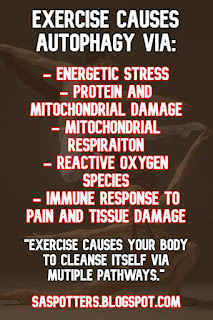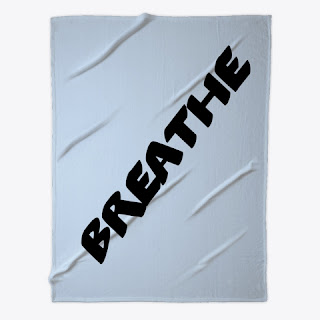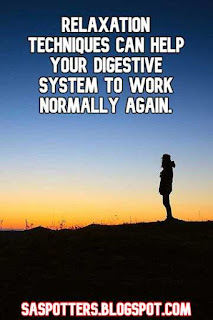 |
| Exercise induces autophagy |
Exercise causes autophagy
Studies have found that exercise increases autophagy activity in many parts of the body including the brain, muscles, heart, liver and fat tissue. Your immune cells also go through autophagy when you exercise. Autophagy from exercise occurs through the same pathways as calorie restriction or fasting.
 |
| Exercise renews important body parts. |
Definition of autophagy
It literally means eat yourself. Autophagy is a biological process that has many favorable health benefits. It is the process by which the body breaks down old, damaged cells and cleans up cellular waste in order to recycle the nutrients. This removes damaged cells and makes way for newer cells.Autophagy has been touted as a remarkable way to prevent degenerative diseases like cancer and mental illnesses because it removes the damaged cells that causes these diseases. Removal of these cells makes way to new cells to form.
It can even remove symptoms of aging like wrinkles and skin tags.
Exercise stimulates autophagy immensely
Multiple studies show that exercise causes a 'potent' stimulation of autophagy in muscle, heart, liver, pancreas, fat, brain and immune cells.The above source says that energetic stress is what causes such high autophagy activity.
When your body needs energy, it will break down old and damaged cells to get it. Fat isn't the only unwanted body tissue that exercise (and energy deprivation) clears away.
The text explains that autophagy provides an emergency, alternative energy source in muscle tissue. There are other ways that exercise induces autophagy. Protein and mitochondria damage stimulates autophagy to clean up the damage and create new cells.
Increased mitochondrial respiration (using oxygen to create energy), higher reactive oxygen species (from exercise) and an increased immune response to pain or muscle damage also increase autophagy.
 |
| Exercise helps the body to clean up. |
Exercise causes cellular damage to proteins and organelles (parts of cells) via heat, mechanical stress and changes in the pH level. Autophagy activates during exercise to clear these damages away and prevent them from accumulating.
How much autophagy do you get from exercise?
This depends on the intensity of the exercise (source). The greater the cellular stress and protein damage caused by exercise, the greater the amount of autophagy that exercises stimulate.If you want to maximize the autophagy-boosting benefits of exercise; increase the intensity, duration or frequency so that greater cellular damage leads to a greater autophagy response.
Remember to get enough rest from exercise and avoid over training, which may cause the body to break down more than what it can rebuild.
 |
| Exercise triggers autophagy. |
Is autophagy from exercise the same as autophagy from calorie restriction or fasting?
The two are extremely similar. Both of them use identical pathways in many instances.
Exercise activates AMPK just like calorie restriction does. The degree to which AMPK is activated depends on the intensity of exercise.
AMPK is the pathway that turns on autophagy (recycling of damaged parts of cells).
The moral of the story is this: You get very similar benefits of autophagy from exercise compared to the autophagy benefits that you get from calorie restriction or fasting.
 |
| Exercise clears damaged cells. |
Does exercise duration increase autophagy?
Yes it does. Autophagy activity increases in proportion to exercise duration. The linked study notes that the autophagy activity is most likely one of the major contributing factors to the overall benefits of exercise. The health benefits of exercise increase along with prolonged exercise duration and frequency. Autophagy increases in the same way.
What type of exercise promotes the most autophagy?
All forms of exercise increase autophagy. The degree to which autophagy is activated depends on the intensity.
 |
| Intensity matters. |
Is exercise better than fasting or calorie restriction for autophagy?
This study says that exercise is the greatest stress that the body faces. It is the stressful state (hormesis) that activates autophagy. The last link explains that stress, of almost any kind, becomes beneficial because of the autophagy response.
I would therefore conclude that exercise is the best way to induce autophagy - IF you do it in such a way that it causes enough stress to induce a lot of autophagy.
Intensity matters. A walk to the bathroom won't induce nearly as much autophagy as a 24 hour fast.
 |
| Exercise remains supreme. |
Is one option truly superior or more complete than the other? We just don't know enough about autophagy to know for sure yet.
Personally, I do both (along with other positive things like cold training and heat therapy).
It is always better to do more, instead of less, when it comes to your health. Stay Strong!
 |
| Support our website and buy this awesome Fleece Blanket! |







































